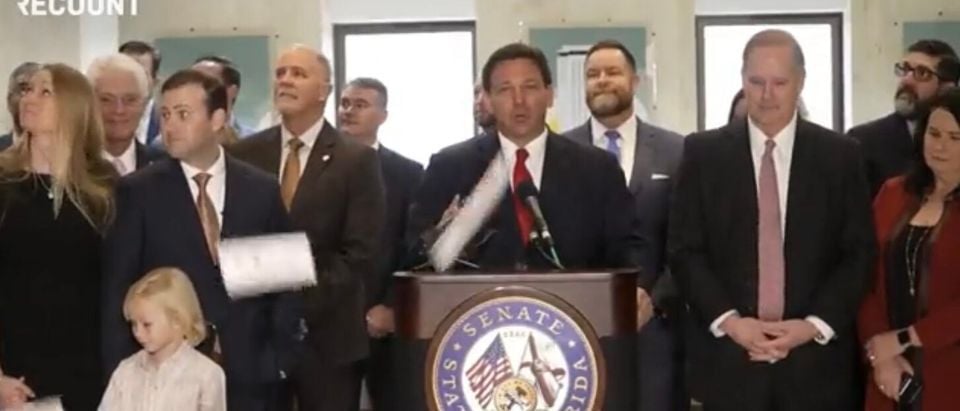Editor’s note: We endeavor to bring you the top voices on current events representing a range of perspectives. Below is a column arguing that the law promoting fatherhood recently signed by Florida Gov. Ron DeSantis is based on a failed big government model of alleviating poverty. You can find a counterpoint here, where Family Foundation President Victoria Cobb argues that more states should adopt policies similar to that of the Florida law.
“Incredibly, there are those who diminish the importance of fatherhood and the nuclear family — we will not let that happen in our state,” Republican Florida Gov. Ron DeSantis claimed as he recently signed a bill committing taxpayers to subsidize and support fatherhood.
While DeSantis was using the moment for political posturing, the numbers do confirm DeSantis’ overall view on the importance of fatherhood. Around one in four American children grow up without a father in the home. Volumes of research show children in single-parent households are at a greater risk of experiencing virtually every negative behavioral, criminal and socio-economic outcome than kids who grow up in two-parent households. Unfortunately, the lofty rhetoric the governor attached to the bill also illustrates two of the false assumptions regularly made in our political debates over absentee fathers, poverty and how government should fix these problems.
A lot of politicians assume they can legislate away the “fatherhood crisis,” as DeSantis and others call it. They cannot. And it is telling that when you look at its substance, DeSantis’ bill doesn’t even pretend to try. Around half of Florida’s $70 million fatherhood bill goes to small public and non-profit education and mentoring programs for dads, mandates that state welfare agencies check up on the role of fathers in households and funds programs to help young men in the state who have gone through the criminal justice system. These are relatively small, well-intentioned and potentially helpful course corrections in state policy that will hopefully improve the lives of some children and adults, but no one should claim they’ll come close to ending a crisis.
Perhaps the most visible new program in the bill is the creation of a statewide Responsible Fatherhood Initiative to “provide resources and inspiration to Florida’s fathers to motivate and enable them.” As the vague wording suggests, there’s not much actual substance there. The bill mandates that Florida taxpayers pay to create a website and public-service advertisements in print media, social media and on television to promote effective parenting. There’s a high likelihood the initiative will amount to little more than feel-good political window dressing — at a cost of millions of dollars to Florida taxpayers.
That leads us to the second flaw in the political fanfare surrounding DeSantis’ signing of the bill. For decades, American political debates and policy outcomes have searched in vain for simple causes of poverty, hoping to identify a single issue or straightforward group of problems that can be addressed by big government from the top down. Fatherhood, crime, and a supposed culture of devaluing work have been preferred targets for conservatives, while progressives tend to cite inequities and mass incarceration as some of the primary drivers of poverty.
The complex truth about poverty in America, however, does not fit on a bumper sticker. We cannot neatly sort these issues into causes and effects — they are all causes and effects of each other and all contribute to poverty. Focusing government attention on fatherhood or whichever social ill best fits one’s political narrative won’t succeed in moving large numbers of Americans out of poverty and toward self-sustaining prosperity.
Politicians love to talk about agency and personal responsibility when faced with the problem of poverty, but in the end taxpayer dollars are spent largely on futile pet projects designed to make poor people do what politicians from both parties think they should do. Unfortunately, the Biden administration’s now-expired child tax credit now looks like a missed opportunity to pivot away from that approach and towards a smarter use of public funds.
As University of San Diego Professor Matt Zwolinski wrote in the Daily Caller last fall, providing unconditional cash benefits is shown by many studies to be a more effective approach than government bureaucracies and welfare programs. When children need financial support, the money should go “directly to families” and trust them “with the freedom and the responsibility to use that money as they see fit,” Zwolinski said.
Notably, bundled within the Florida fatherhood bill is a modest increase in a stipend that is given to children who have worked their way through the state’s foster care system and are attending college and other post-secondary education options. This portion of the bill wisely treats its recipients, who are often born into poverty and without a father present, as responsible and capable of deciding what they need and how their money should be spent.
Kids without fathers, and taxpayers, would be better off if Florida’s lawmakers had embraced this individual responsibility model and focused their fatherhood initiative — and the state’s other welfare programs — on providing cash benefits.
The Florida fatherhood bill funds some helpful programs amidst its window dressing. But Gov. DeSantis often talks about trusting individuals, not the government, to make the best decisions. In this case, if DeSantis wanted to help families, he should’ve opted for cash payments rather than public messaging-focused campaigns. Policies that trust individuals and put personal responsibility first are the way to pivot away from American welfare’s many failures and decrease poverty. Conservatives and liberals should be able to agree on that.
Max Gulker is a senior policy analyst at Reason Foundation.


